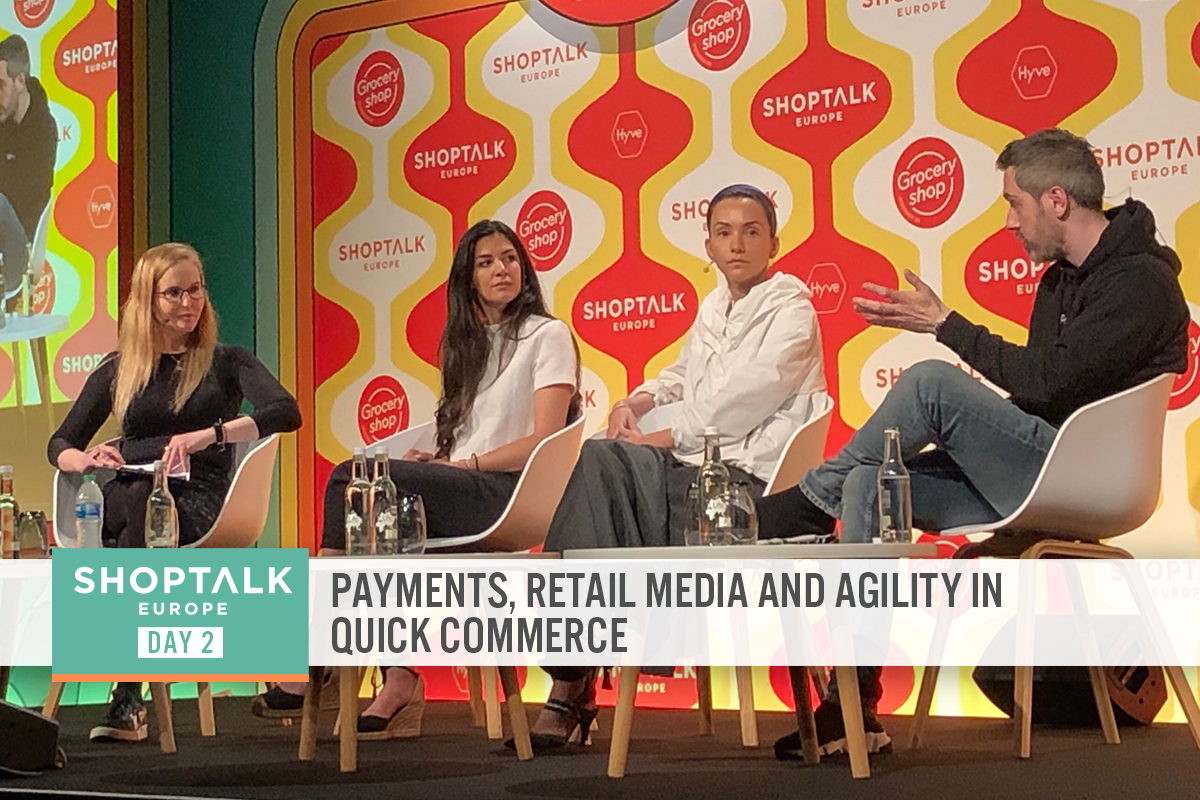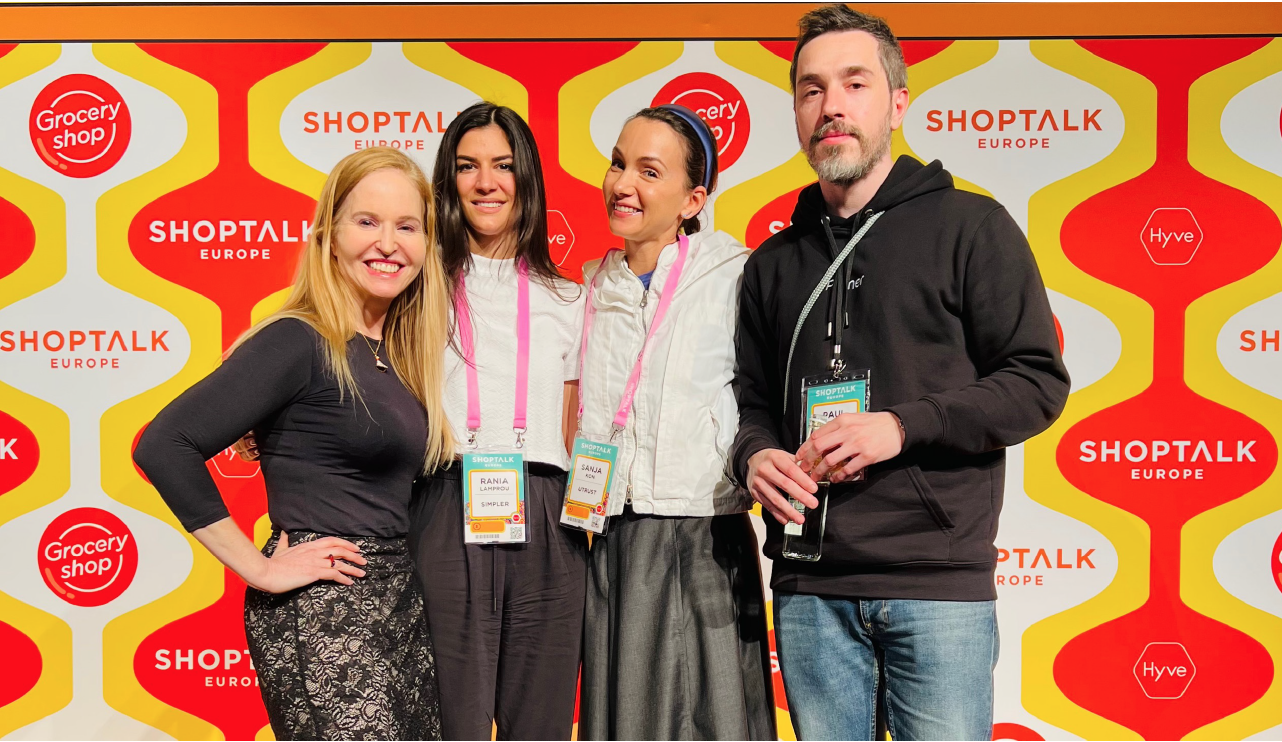
albert Chan
Introduction
On June 7, 2022, the Coresight Research team attended day two of the Shoptalk Europe 2022 conference in London, England. Deborah Weinswig, CEO and Founder of Coresight Research, hosted a Tech Spotlight session on payments and loyalty solutions.
Shoptalk Europe 2022, Day Two: Coresight Research Insights
Payments and Loyalty
Weinswig hosted presentations from startups offering services in payments and loyalty programs and interviewed those presenting.
Simpler: A company that offers one-click checkouts across a variety of sites and platforms. Rania Lamprou, Co-Founder and CEO, explained how it takes an average of 22 clicks to check out online, fueling a 70% cart abandonment rate on desktop (and an 85% abandonment rate on mobile). Simpler offers a one-click purchase button with a claimed 50% shorter registration time than traditional checkout (on first use) that can be used across websites, online ads and email newsletters, while QR codes can link to the purchase button for offline media such as billboards and TV ads. Retailers benefit from visibility and data on shoppers who may otherwise check out as guests.
Utrust: A company enabling payments in crypto. Sanja Kon, CEO, argued for the benefits of cryptocurrencies, including no borders and no intermediaries reducing time and cost for payments. Kon estimated crypto users now number over 300 million worldwide, up from 220 million in 2021. Utrust, she explained, serves as “bridge builders to Web 3.0 payments,” helping merchants achieve lower payment fees, less fraud lost in chargebacks and faster settlements. Companies can issue their own tokens as part of a crypto-based loyalty program, too. Kon told Weinswig that merchants are increasingly happy to settle in cryptocurrencies, whereas just a couple of years ago, most wanted to settle in fiat currencies.
Primer: A company that seeks to unify payments infrastructure. Paul Anthony, Co-Founder, explained that retailers typically see a technical fragmentation across the payments “stack” which includes a mix of payment service providers, local payment enablers and third-party services (such as for fraud detection and QR code providers). Primer provides retailers with a unified payments integration, an automation platform for payments—so that companies have to think about payments only once.
Asked by Weinswig for their one-line takeways to retailers, the presenters offered the following:
- Lamprou: Make it easy for consumers to checkout where they want.
- Kon: Consider crypto as payment method.
- Anthony: It’s possible to consolidate payments in the commerce stack.
 Left to right: Coresight Research CEO and Founder Deborah Weinswig, Simpler Co-Founder and CEO Rania Lamprou, Utrust CEO Sanja Kon and Primer Co-Founder Paul Anthony
Left to right: Coresight Research CEO and Founder Deborah Weinswig, Simpler Co-Founder and CEO Rania Lamprou, Utrust CEO Sanja Kon and Primer Co-Founder Paul AnthonySource: Coresight Research[/caption]
Learnings from Other Companies on Day Two
ThredUP: The resale platform’s customers are driven first by value (a driver for 63% of shoppers), second by sustainability and third by the “thrill of the hunt,” according to Dan DeMeyere, Head of International, ThredUP. The company’s shoppers are less affluent than average and ThredUP is trying to insulate them from rising costs in fulfillment: “We know they will have to cut things out of their life,” amid rising inflation, DeMeyere said.
Bacardi: Ignacio Vazquez Guerra, Global Head of Marketing, Travel Retail for Bacardi pointed to Covid-19 accelerating several trends that existed before the pandemic:
- Digitalization
- Premiumization: Consumers want to drink better
- Health and wellness across all categories
- Sustainability: "A hygiene factor but an essential hygiene factor”
Mimeda: Kina Demirel, Managing Director of Mimeda, a Turkey-based retail media firm, noted that grocery retailers are huge traffic destinations and they sit on masses of data—both of which will fuel their retail media (advertising) businesses. “Retailers will be the biggest media companies in the future,” Demirel said, “We will maybe be the new media emperors.”
PepsiCo: For decades, PepsiCo’s “last mile” in delivery consisted of shipping in bulk, via trucks, to stores. Now, it faces delivering small packages to millions of locations, as well as fulfilling the traditional last mile to stores. Anna Farberov, GM PepsiCo Labs, Global Venture & Innovation at PepsiCo explained how PepsiCo Labs identifies, tests and scales up startups to help the CPG giant, and she pointed to three specific challenges for the company in the last mile:
- Picking: PepsiCo partnered with Autostore for an automated storage and retrieval system.
- Shipping: PepsiCo faced a choice of gig providers, third-party carriers, the PepsiCo fleet and traditional shippers. It partnered with a startup to identify real-time visibility of what is available and use AI to find the best solution.
- Electrification: PepsiCo owns and operates one of largest vehicle fleets in the world, and electrification of it is a challenge still being worked on.
Carrefour: Vincent Cotte, Director of E-commerce Strategy at Carrefour Group, pointed to the benefits of partnerships, too. In Carrefour’s case, this was to tap into demand for quick commerce (or q-commerce). The company partnered with Uber Eats for its app and customer base, Cajoo for its industrialized dark stores, and Carrefour’s own “Dark Proxi” stores that leveraged its convenience estate. Through partnerships and an agile approach, the retailer got to 29 rapid e-commerce preparation sites in 11 French cities in six months.